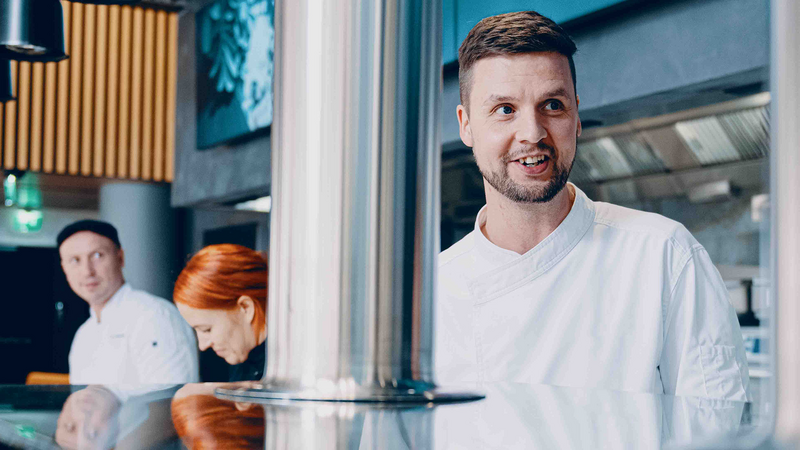To mitigate the long-term impacts of climate change, many organizations (including ISS) use science-based targets to help meet our sustainability goals, future-proof company growth, and ultimately achieve net zero. Science-based targets give companies a clear path to reduce their greenhouse gas emissions in alignment with the latest climate-science consensus. As a result, leaders have a framework to help them achieve carbon-reduction goals and ensure their organization drives ambitious action against climate change.
At ISS, our near-term science-based emissions reduction target has been validated by the Science Based Targets initiative (SBTi), particularly focusing on decarbonization efforts related to our supply chain and service delivery. One of the most significant ways we achieve this is through our food business, as ISS Guckenheimer in the United States is not only a substantial part of our company, but also acts as a driving force for our company’s sustainability efforts.
Food-Focused Carbon Reduction
While our overall sustainability goals are interconnected, food service is an area where we’ve seen real progress in our efforts to facilitate sustainable eating while also providing high-quality foods for our clients. For example, by using technological solutions like Winnow, we’re able to understand the amount of food waste a kitchen produces and collect granular data and analytics, using the platform to pinpoint how we can make meaningful waste reductions. As Winnow and other solutions develop to include increased automation, machine learning, and artificial intelligence, our ability to mitigate waste in our service delivery will only become more robust in the coming years.
As up to 40% of food in the United States goes uneaten, food waste represents the country’s largest component of municipal solid waste. It’s also a massive environmental burden due to methane gas produced as food decomposes in landfills. Given food waste’s negative impact on the environment, our approach supports a culture of sustainable cooking among ISS Guckenheimer chefs, who help drive awareness of sustainability efforts at client sites and commit to reducing our company’s carbon footprint through their food programming.
In addition to seeking more sustainable foods and ways to procure them, our chefs and foodservice teams deliver a variety of options that combine client well-being and satisfaction with a reduced environmental impact.
Making Changes to the Menu
ISS Guckenheimer Chef Rick Green says that throughout his career, he’s seen plant-based diets and other more curated food options become increasingly popular.
” he says. “With more emphasis on eating locally and sustainably, as well as toward animal welfare, organic products, and alternative proteins, we’ve seen a big evolution in food service and specifically in the contracts we sign with clients. From the C-suite down, there’s been a heavy need for education, resources, and alternative solutions to provide people with more sustainable nourishment.”
Our food business emphasizes plant-based foods, with a continuous focus on building menus that meet client needs while also cultivating more sustainable kitchens. Many of our chefs also receive Humane Society International culinary training to help them reduce the use of animal proteins and cultivate relationships with ethically sourced meat producers. In alignment with customer demands, chefs also tend to reduce the use of meats like lamb or beef, which have a particularly high carbon footprint due to their agricultural needs.
Several factors align to help cultivate a smaller footprint. Beyond more plant-based items, where and how food is procured helps curate a more streamlined operation. By supporting more local food producers and making progress on fleet reduction initiatives, we’re better able to achieve our rigorous sustainability targets. Making gradual environmentally friendly changes throughout the organization allows us to meet our long-term sustainability goals and helps our clients reduce their carbon footprint over time.
Our SBTi commitment gives us a more meaningful pathway toward our net zero ambitions, giving clients confidence that our organization is a trusted partner in the delivery of sustainable services. To meet our own company goals, we’re currently on track to decarbonize our fleet and transition to renewable electricity. In addition to electric vehicles, we’re also collaborating with our customers to find opportunities to decarbonize their workplaces, through our food business or other industries we support.
Similarly, we’re establishing new supply chain and procurement standards, as well as working to ensure our suppliers and partner organizations have carbon-elimination plans and share our broader sustainability goals. These efforts all entwine to play an active role to decarbonize the planet. Our food business is a strong pillar for waste reduction, but just one among many specifically curated to reduce long-term energy consumption.
A Dedication to Carbon Reduction
ISS plans to reach full-scope net zero by 2040. To do this, we’re championing sustainability in the workplace and making ambitious goals for the future. We also enable our employees to participate in the mission to help both the company and our customers meet their sustainability goals through ongoing professional development opportunities and aiding in energy-saving initiatives. By making meaningful changes in how we operate, as well as working with our partners to boost sustainability, we’re helping our customers reduce their overall energy consumption and working to make a positive impact on the planet.
